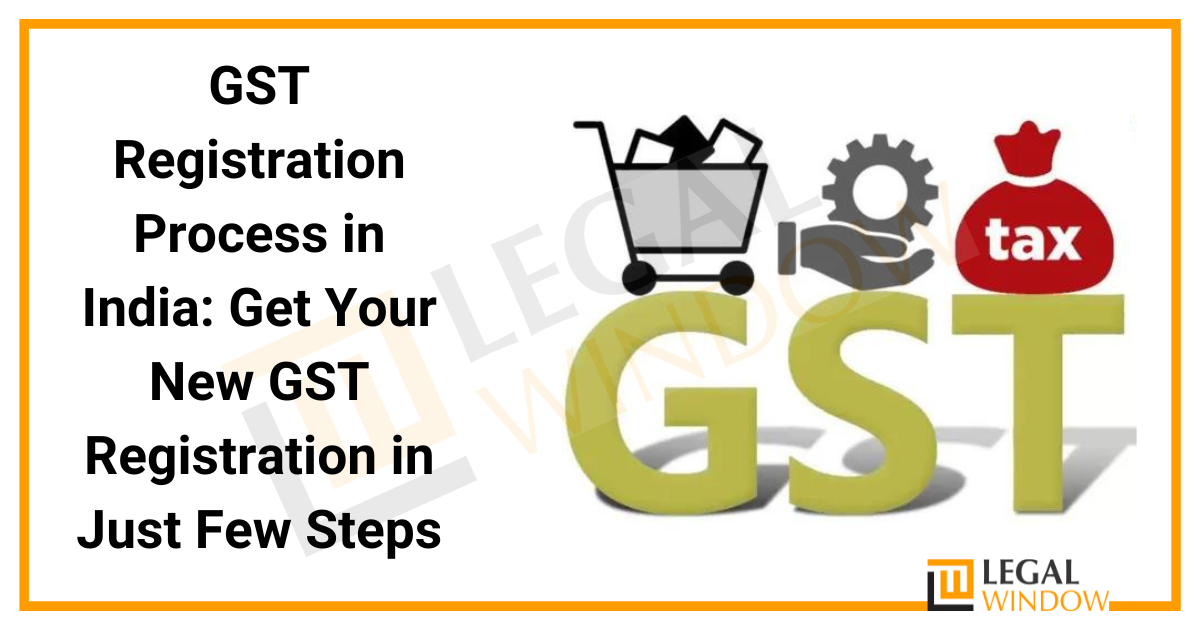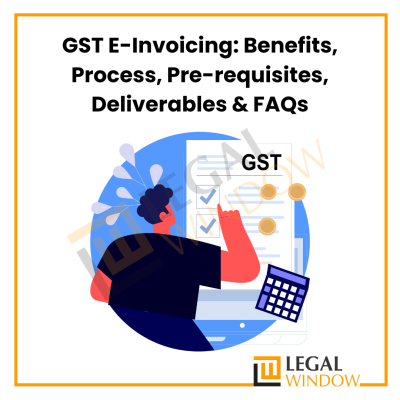GST Registration Process in India: Get Your New GST Registration in Just Few Steps
- March 29, 2023
- GST, Miscellaneous

Goods and Services Tax (GST) was introduced in India on July 1st, 2017, to unify the country’s indirect tax system. GST is a value-added tax levied on goods and services consumed in India. It replaced various indirect taxes like excise duty, service tax, and value-added tax (VAT). Any business, individual, or entity engaged in the supply of goods and services must register for GST in India. In this article, we will discuss the GST registration process in India.
| Table of Content |
Meaning of GST Registration
GST registration is a mandatory process for all businesses involved in the supply of goods or services in India. Any business whose annual turnover exceeds Rs. 20 lakhs (Rs. 10 lakhs for some states) must register for GST. GST registration is a 15-digit unique identification number that is allotted by the government after verifying the business details and documents.
Benefits of GST Registration in India
The following are the benefits of GST Registration:
- Legally Compliant: GST registration ensures that your business is legally compliant with the tax laws of India. Non-compliance can lead to heavy fines and penalties. Therefore, it is important to register for GST to avoid any legal consequences.
- Input Tax Credit: Input Tax Credit is a tax benefit that businesses can claim for taxes paid on purchases. GST registration enables businesses to claim input tax credit on their purchases, which reduces the tax burden on their sales.
- Increased Credibility: GST registration enhances the credibility of your business. It assures customers and suppliers that you are a registered business and operate legally. This can lead to increased trust and better business opportunities.
- Inter-State Business: GST registration is mandatory for businesses engaged in inter-state supply of goods and services. Registration allows such businesses to operate smoothly and without any legal hurdles.
- Online Transactions: GST registration enables businesses to carry out online transactions. This is because GST registration is linked to the business’s bank account and facilitates seamless transactions.
- Reduced Tax Liability: GST registration enables small businesses to avail of the Composition Scheme. Under this scheme, businesses with an annual turnover of up to Rs. 1.5 crore can pay a fixed percentage of their turnover as tax, instead of the regular GST rates. This reduces the tax liability of small businesses and helps them grow.
Who needs to register for GST in India?
As per the CGST Act, 2017 the following persons are required to register for GST in India:
- Any business whose turnover exceeds Rs. 20 lakhs (Rs. 10 lakhs in the case of Northeastern states, Himachal Pradesh, and Uttarakhand).
- Any business involved in the inter-state supply of goods and services.
- Any business making taxable supplies on behalf of other taxable persons, e.g., agents or brokers.
- Any person who is required to pay tax under the reverse charge mechanism.
- E-commerce operators, regardless of turnover.
- Any non-resident person supplying goods and services in India.
Documents Required for GST Registration
The following documents are required for GST registration:
- PAN Card
- Aadhaar Card
- Proof of business registration such as Certificate of Incorporation, Partnership Deed, etc.
- Bank account statement or cancelled cheque
- Address proof such as rent agreement, electricity bill, etc.
- Photographs of the business owner/partners/directors
- Digital Signature
GST Registration Process in India
The GST registration process in India is straightforward and can be completed online through the GST portal. The process can be divided into the following steps:
- Step 1: Determine the eligibility: The first step towards GST registration is to check the eligibility of the business entity. Any business entity whose annual turnover exceeds the threshold limit of Rs. 20 lakhs (Rs. 10 lakhs for North-Eastern states) is required to obtain GST registration. Additionally, entities involved in inter-state supply, e-commerce, and export/import of goods and services must also register for GST irrespective of their turnover.
- Step 2: Gather the required documents: Once the eligibility is determined, the next step is to gather the necessary documents required for GST registration. The list of documents required includes:
- PAN Card of the Business Entity
- Aadhaar Card of the authorized signatory
- Proof of business registration such as Partnership deed, Memorandum of Association (MOA), Articles of Association (AOA), etc.
- Bank account Statement or Canceled Cheque
- Address proof of the business premises such as electricity bill, rent agreement, etc.
- Digital signature of the authorized signatory
- Photograph of the authorized signatory
- Step 3: Submit the application: The application for GST registration can be submitted online through the GST Portal. The process involves filling in the details of the business entity, including its name, PAN number, email ID, and mobile number. The authorized signatory’s details, such as name, Aadhaar number, and PAN number, must also be provided. Once the details are entered, the application must be uploaded along with the necessary documents.
- Step 4: Verification: After submitting the application, a verification process is initiated, which may take up to 10-15 days. The verification process includes the verification of documents and the details provided in the application. Once the verification process is complete, the GST registration certificate is issued.
- Step 5: GSTIN generation: After the verification process, the GSTIN (Goods and Services Tax Identification Number) is generated and sent to the registered email ID and mobile number. The GSTIN is a unique 15-digit identification number that is required to be mentioned on all GST invoices and returns.
With its expert professionals, Legal Window offers you a high degree of satisfaction and quick delivery of GST Registration Certificate, as well as better dealing with government requirements. For GST registration and GST compliance services, please contact our team at 072407-51000 or admin@legalwindow.in.
Important points to keep in mind regarding GST Registration
The following are the important points to be kept in mind regarding GST Registration in India:
- Threshold Limit: Businesses with a turnover of more than Rs. 20 lakhs (or Rs. 10 lakhs in northeastern states) must register for GST. However, businesses that operate only within a state and do not engage in inter-state supply are exempt from GST registration.
- Composition Scheme: Businesses with a turnover of up to Rs. 1.5 crore can opt for the composition scheme, which allows for a lower GST rate and reduced compliance requirements.
- Cancellation of Registration: If a business fails to comply with the GST regulations, its registration may be cancelled. For example, if a business does not file its GST returns for a specified period, its registration may be cancelled.
- GST Returns: Registered businesses must file GST returns every month, quarter, or year, depending on their turnover. Failure to file GST returns can result in penalties and fines.
- Input Tax Credit (ITC): Registered businesses can claim ITC on the GST paid on their purchases, which can be set off against the GST liability on their sales. However, businesses must ensure that their suppliers have also filed their GST returns and paid the GST due before claiming ITC.
 Conclusion
Conclusion
GST Registration is a crucial process for businesses in India. It ensures compliance with the taxation system and helps businesses avoid legal issues. The process of GST registration in India is a simple and straightforward process that can be completed online. However, it is essential to ensure that all the necessary documents are in place to avoid any delay in the registration process.
CA Pulkit Goyal, is a fellow member of the Institute of Chartered Accountants of India (ICAI) having 10 years of experience in the profession of Chartered Accountancy and thorough understanding of the corporate as well as non-corporate entities taxation system. His core area of practice is foreign company taxation which has given him an edge in analytical thinking & executing assignments with a unique perspective. He has worked as a consultant with professionally managed corporates. He has experience of writing in different areas and keep at pace with the latest changes and analyze the different implications of various provisions of the act.
Categories
- Agreement Drafting (23)
- Annual Compliance (11)
- Change in Business (36)
- Company Law (148)
- Compliance (90)
- Digital Banking (3)
- Drug License (3)
- FEMA (17)
- Finance Company (42)
- Foreign Taxation (6)
- FSSAI License/Registration (14)
- GST (120)
- Hallmark Registration (1)
- Income Tax (202)
- Latest News (34)
- Miscellaneous (165)
- NBFC Registration (8)
- NGO (14)
- SEBI Registration (6)
- Section 8 Company (7)
- Start and manage a business (21)
- Startup/ Registration (130)
- Trademark Registration/IPR (40)
Recent Posts
About us
LegalWindow.in is a professional technology driven platform of multidisciplined experts like CA/CS/Lawyers spanning with an aim to provide concrete solution to individuals, start-ups and other business organisation by maximising their growth at an affordable cost.








